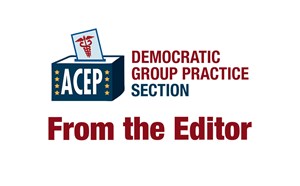
ACEP 2016 Recap - Message from the Chair
At the first Democratic Group Practice Section meeting I attended we spent a long time discussing if we would have enough members to maintain our status as a section. We certainly have come a long way with great panel discussions and new members adding new ideas to the section. Thanks to those who attended the meeting last October and special thanks to our outgoing immediate past chair Savoy Brummer MD FACEP who has served as chair of the section for the past two years. Highlights from this year included….
ACEP President, Jay Kaplan MD FACEP attended and gave an update on the College. ACEP continues to support emergency physicians through advocacy for fair billing, disaster planning, physician wellness and ensuring that emergency physicians remain fairly compensated as we move away from fee for service towards pay for performance. The election of the new ACEP president, Paul Kivela MD FACEP, (also a Democratic Group Practice Section member) demonstrates the College’s embrace of practice diversity.
We had a robust discussion about the goals for the section. We discussed: how best to increase section meeting attendance, how the section can participate in the president and board selection process and perhaps draft some questions for consideration, and how best to reach out to residents.
The meeting ended with a panel discussion around aging physicians and how partners leave a democratic group practice. The panel included Vidor E. Friedman, MD, FACEP, Wesley Curry MD FACEP from CEP, Marc Futernick, MD, FACEP, Kenneth Gummerson, MD. The diversity of the panel really reflects the diversity of the section from single site democratic groups to large multi-specialty groups and many in-between with different parts of the country represented. It was great to hear how different groups approach the generational differences in partners. We covered a wide range of topics including: productivity of aging partners, expectations of millennials new to the practice, financial buy outs of “de-partners,” and the strategies some groups use to distribute the burden of night shifts.
Here is a quick take-away summary of the issues discussed.
Buy Outs: Some groups simply divide up the percentage of the accounts receivable, others have that plus a 10% increase, others value the company and someone buying out gets the percentage that they owned. Whatever the formula it needs to be clearly defined and agreed upon. It also must be sustainable and anticipate problems if multiple partners decide to leave or retire in the same year. Make sure these types of things are covered in detail and in writing if you are interviewing for a position.
Loss in Productivity with aging physicians: Dr. Gummerson noted that some of the most productive physicians are those practicing well into their sixties and seventies. What may be thought of as an aging problem may actually be a different issue such as practice style, stress at home or health problems. It’s important to recognize these disparities and as Dr. Friedman noted, “Moving feelings to conscious informed discussion is vital.” In other words you can’t have physicians thinking, why does that person work only days or why is another partner’s patients per hour two standard deviations below the mean. Healthy discussion of these issues prior to it becoming a problem will make a happier more productive group.
Nights Shifts: Some groups simply choose to pay more for night shifts to entice younger physicians that may have medical student debt to pick them up. Other groups simply vote to allow older partners to opt out of night shifts entirely. It was noted that today’s younger physicians may not be as willing as physicians from 20-30 years go to work only nights for increased incentive and they may not be interested in partnership. Certainly everyone agreed that whatever decision is made, embracing the democratic ideals of transparent decisions with involvement of the physicians is the most important. As Dr. Curry noted—we let each site decide and it works out.
Let your officers know what you would like to see from the section in the coming year. What would you like to see discussed in next years panel. I challenge each person who was at this year’s meeting to bring two people to next year’s meeting.
Michael L Becker MD FACEP FAAEM




